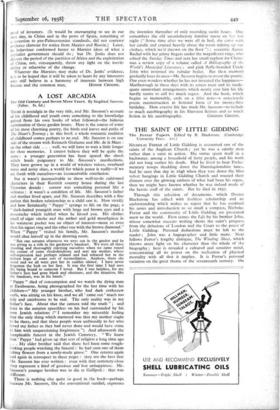A LOST ARCADIA
THERE is nostalgia in the very title, and Mr. Sassoon's account
of his childhood and youth owes something to the knowledge gained from his own books of what followed—the hideous culmination of those garden hours, Here is the source of some of his most charming poetry, the birds and leaves and paths of The Heart's Journey ; in this book a whole romantic tradition of childhood comes perhaps to an end. Mr. Sassoon is on one side of the stream with Kenneth Grahame and Mr. de la Mare : on the other side . . . well, we will have to wait a little longer for those memories. I cannot believe they will be quite the same : a younger generation has been spared the shock which lends, poignancy to Mr. Sassoon's recollections. They have grown up in a world of wireless voices, overhead wires and noisy skies, a world for which peace is really—if we are frank with ourselves—an inconceivable conclusion.
But it wasn't inconceivable to these well-to-do cultivated characters in their Kentish country house during the last Victorian decade : sorrow was something personal like a sickness : it wasn't a condition of life. Mr. Sassoon's father and mother lived apart, and Mr. Sassoon describes with a fine pathos this broken relationship as a child saw it. How vividly and how Semitically " Pappy " springs to life on the page, a "dark-haired youngish man with large sad brown eyes and a moustache which tickled when he kissed you. His clothes smell of cigar smoke and the amber and gold mouthpiece in his waistcoat pocket was an object of interest—more so even than his signet ring and the other one with the brown diamond." When " Pappy " visited his family, Mr. Sassoon's mother would shut herself up in the drawing room.
"But one autumn afternoon we were out in the garden and he was giving us a ride in the gardener's handcart. We were all three shouting and thoroughly enjoying ourselves when we came round the corner of some rhododendrons and met my mother, whose self-repression had perhaps relaxed and had released her in the forlorn hope of some sort of reconciliation. Anyhow, there she stood and we all went past her in sudden silence. I have never forgotten the look on her face. It was the first time I had seen life being brutal to someone I loved. But I was helpless, for my father's face had gone blank and obstinate, and the situation, like the handcart, was in his hands."
" Pappy " died of consumption and we watch the dying man at Eastbourne, being photographed for the last time with his children—" My younger brother, who had dark corkscrew curls, was sitting on his knee, and we all 'came out-' much too tidy and smirksome to be real. The only reality was in my father's face. About that the camera told the truth " ; and later in the autumn speechless on his bed surrounded by his own Jewish relations ("I remember my miserable feeling that the only thing which mattered was that my mother ought to be there, and that-these people were unfriendly to her who loved my father as they had never done and would have come to him with unquestioning forgiveness "). And afterwards the inexplicable funeral in the Jewish Cemetery. "We knew that Pappy ' had given up that sort of religion a long time ago • . . My elder brother said that there had been some rough- looking people watching the funeral he had seen one of them taking flowers from a newly-made grave." One returns again and again in retrospect to these pages : they are the best that Mr. Sassoon has ever written : even with that cemetery-close they represent a kind of gracious and lost unhappiness. Mr. Sassoon's younger brother was to die at Gallipoli : that was different.
There is nothing else quite so good in the book—perhaps ecause Mr. Sassoon, hice the conventional sundial, expresses
the intention thereafter of only recording sunlit hours. One remembers the old unsatisfactory familiar nurse on her last night (" Some time after we were all in bed, she came with her candle and cruised heavily about the room tidying up our clothes, which we'd thrown on the floor ") ; eccentric Auntie Rachel with her grimy fingers under the magnificent rings, who edited the Sunday Times and sent her small nephew for Christ- mas a review copy of a volume called A Bibliography of the World's Municipal Literature ; and pink fluffy-bearded Uncle John who invented the tubular boiler. But Eliot memory gradually loses its aura—Mr. Sassoon begins to invent the poetry. One even wonders whether he has not invented the happiness— Marlborough in those days with its rotten meat and its inade- quate sanatorium arrangements which nearly cost him his life hardly seems to call for much regret. And the book, which begins so memorably, ends on a false note—a consciously poetic reconstruction in fictional form cf his twenty-first birthday. How evasive life has made Mr. Sassoon—to include so much autobiography in his Sherston fictions and so much










































 Previous page
Previous page